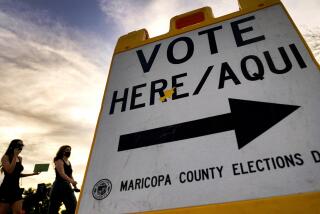Supreme Court Restricts Electoral Law Challenges
- Share via
WASHINGTON — The Supreme Court made it slightly more difficult Monday for the Justice Department to block changes in electoral districts in the South that could reduce the political clout of African Americans and other minorities.
Interpreting the Voting Rights Act of 1965, the court said the law empowers federal civil rights officials to “freeze” proposed changes only when it is clear that they will cut back on the number of minority representatives.
A plan that may unfairly “dilute” the voting clout of a minority community can be challenged later, but not blocked in advance, the court said on a 7-2 vote.
The case from a rural Louisiana school board clarifies one provision of the 1965 law. A special clause known as Section 5 was added to prevent cities, counties, school boards and other government bodies throughout the South from switching their voting “standards, practices or procedures” in a way that would hurt minorities. Before making such changes, these jurisdictions must get clearance from the Justice Department.
Justice Sandra Day O’Connor, writing for the court, said Justice Department lawyers have used too stringent a legal standard in deciding whether to give this initial approval to election-system changes to Southern states and communities.
The case (Reno vs. Bossier Parish, 95-1455) involved a school board in Louisiana.
In other actions, the court:
* Revived a lawsuit filed by cargo handlers in a Los Angeles rail yard who contended that their jobs were switched to a private contractor to cut back on their pensions and medical benefits (Inter-Modal Rail Employees vs. Atchison, Topeka and Santa Fe Railways, 96-491).
While the case raised a broad issue of federal law, the court did not rule on it. By a 9-0 vote, the justice merely agreed that both medical as well pension benefits are protected by a 1974 law that forbids employers to fire or penalize workers over such benefits.
But the justices sent the case back to Los Angeles for a judge to decide whether these workers were moved for general business reasons, which is legal, or solely to reduce their medical and pension benefits, which is illegal.
* Refused to hear an appeal from a Wisconsin landlord who was fined under state law for refusing to rent to a lesbian as her roommate (Hacklander-Ready vs. Wisconsin, 96-1457). While people have a general privacy right to choose their roommates, the state court said, this Madison landlord gave up that right when she offered the space for rent.
More to Read
Get the L.A. Times Politics newsletter
Deeply reported insights into legislation, politics and policy from Sacramento, Washington and beyond. In your inbox twice per week.
You may occasionally receive promotional content from the Los Angeles Times.











